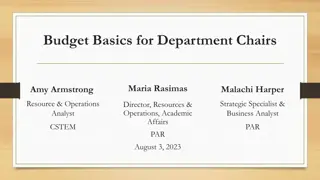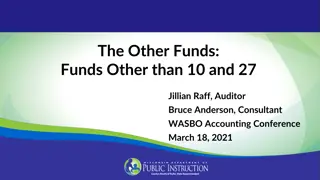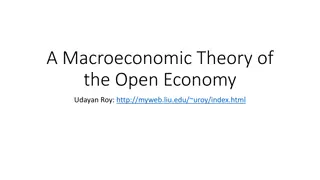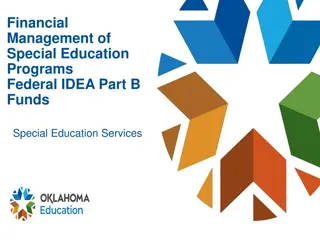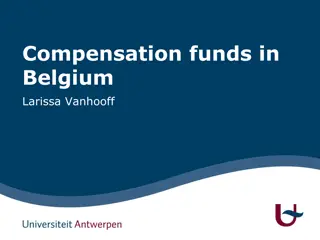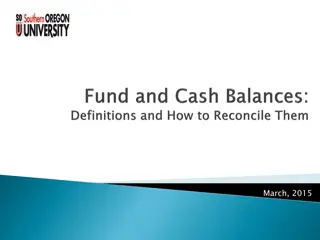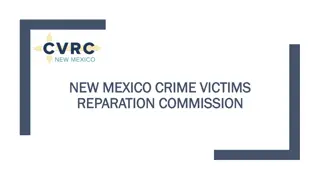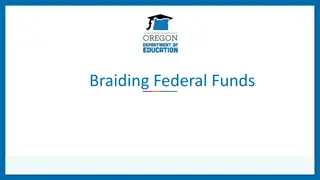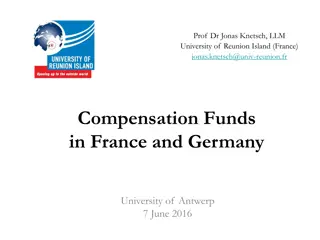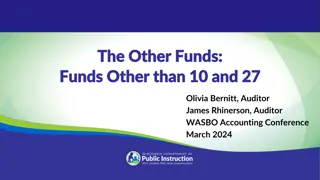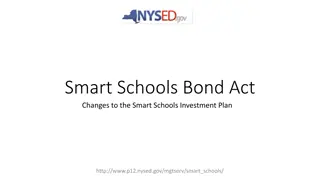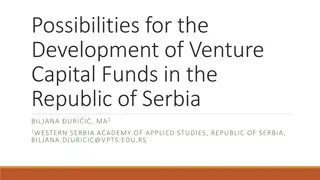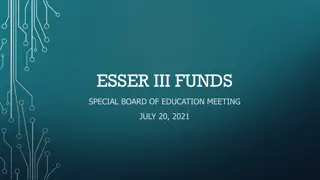Impact of NVIDIA Stock Surge on Mutual Funds and Passive Funds Exposure
NVIDIA's stock surged by 16% following strong financial performance, impacting various mutual funds and passive funds. Mutual funds like Motilal Oswal, Mirae, and Franklin have significant exposure to NVIDIA, while non-broad-based passive funds also hold substantial positions. The exposure of broad-
4 views • 10 slides
Budget Basics for Department Chairs - Understanding Funds and Processes
This document provides essential information on budget basics for department chairs, covering topics such as types of funds (state and auxiliary), fiscal authority, budget reconciliation, procard and purchasing procedures, and timeline for budget processes. It outlines different funds like General F
0 views • 18 slides
Evolution of Mathematical Theories and Proof Systems
Development of mathematical theories such as model theory, proof theory, set theory, recursion theory, and computational complexity is discussed, starting from historical perspectives with Dedekind and Peano to Godel's theorems, recursion theory's golden age in the 1930s, and advancements in proof t
1 views • 29 slides
Psychological Theories of Criminality: Understanding the Roots
Psychological theories of criminality delve into the association between intelligence, personality, learning, and criminal behavior. Major theories include Psychodynamic Theory by Freud, Behavioral Theory by Bandura, and Cognitive Theory by Kohlberg. These theories explore how unconscious mental pro
1 views • 20 slides
Fund Accounting Entities and Definitions Explained
Explore the world of fund accounting entities and definitions, including the roles of various funds such as General Fund, Debt Service Funds, Capital Projects Funds, Food and Community Service Funds, Custodial Fund, and Trust Funds. Learn about the unique characteristics and regulations that govern
0 views • 39 slides
Understanding Private vs. Public Saving and Financial Market Dynamics
Explore the concepts of private and public saving in relation to national income, expenditure, and government fiscal policies. Delve into the analysis of saving, investment, financial markets, and the impact of real interest rates on loanable funds. Gain insights into the relationships between savin
0 views • 36 slides
Understanding the Theory of Firms: Neoclassical vs. Modern Approaches
The theory of firms is explored through the Neoclassical and Modern perspectives. Neoclassical theory focuses on profit maximization, while Modern theory delves into managerial, principal-agent, and transaction cost theories. The discussion covers criticisms of Neoclassical theory and the essential
1 views • 79 slides
Theories of Causation in Psychological and Social Sciences
Overview of theories of causation categorized into psychological, social psychological, and sociological perspectives. Psychological theories focus on instinctive, biological, and psychological qualities of abusers, including Attachment Theory, Psychodynamic Theory, Social Learning Theory, and Situa
0 views • 15 slides
Understanding Political Theory through a Contextual Approach
Exploring G.H. Sabine's perspective on political theory through a contextual approach, emphasizing the importance of historical context and societal influences. Sabine argues that while political theory evolves with its contemporary politics, it should be analyzed within its specific time and social
0 views • 9 slides
Macroeconomic Theory of the Open Economy by Udayan Roy
This presentation discusses key concepts related to the open economy, such as net exports equaling net capital outflow, national saving equaling domestic investment plus net capital outflow, the loanable funds theory of the real interest rate, and the relationship between saving, investment, and net
0 views • 31 slides
Evolution of Light Theory: From Wave Theory to Quantum Theory
At the turn of the century, the discovery of the photoelectric effect challenged the wave theory of light, leading to the development of the quantum theory by Max Planck and Albert Einstein. This new theory introduced the concept of discrete energy units known as quanta, bridging the gap between wav
1 views • 62 slides
Understanding Mutual Funds: A Comprehensive Guide
This presentation provides an educational overview of mutual funds, covering topics such as what mutual funds are, how to invest in them, the structure of mutual funds, the role of Asset Management Companies (AMCs), and how mutual funds work. It also explores the classification of mutual funds, inve
0 views • 24 slides
Chamberlain H.S. Title I Meeting 2021-2022 Overview
Chamberlain High School's annual Title I meeting presentation provides information on Title I funds, parent and family engagement plans, and ways for parents to get involved. Learn about Title I, parent rights, the school compact, available funds, and how you can help decide how funds are spent. Don
0 views • 10 slides
Dp-branes, NS5-branes, U-duality, and M-Theory Overview
Overview of Dp-branes, NS5-branes, and U-duality derived from nonabelian (2,0) theory with Lie 3-algebra. Introduction to M-theory, including M2-branes and M5-branes in the strong coupling limit. Discussion on BLG theory, Lorentzian Lie 3-algebra, and the ABJM theory for M2-branes.
1 views • 32 slides
Guide to Allocating Title I Funds to Schools - June 2018
Federal Title I, Part A funds are vital for districts with high numbers of children from low-income families. This guide outlines the process of selecting Title I schools and allocating funds based on poverty percentage and school performance. Key steps include obtaining the district's Title I alloc
5 views • 14 slides
Understanding Financial Management of Special Education Programs
Federal IDEA Part B funds support special education programs, helping LEAs implement IDEA. These funds must be used for allowable purposes like special education services, appropriate technology, and early intervening services. It's essential to use IDEA Part B funds to pay for excess costs and supp
1 views • 105 slides
Managing Student Extracurricular Funds in School System
Student extracurricular funds play a critical role in supporting organized student activities beyond the regular curriculum. Trustees have the authority to establish and manage these funds following specific guidelines outlined in the regulatory framework. The funds are meant to benefit students, an
0 views • 56 slides
Understanding Time-Independent Perturbation Theory in Quantum Mechanics
Perturbation theory is a powerful tool in solving complex physical and mathematical problems approximately by adjusting solutions from a related problem with known solutions. This theory allows for more accurate approximate solutions by treating the difference as a small perturbation. An example inv
0 views • 19 slides
Maximizing Title IV Part A Funds for Well-Rounded Education
The Title IV Part A program focuses on providing well-rounded education opportunities to students. Districts receiving over $30,000 must conduct a needs assessment and allocate at least 20% of funds for well-rounded activities. Funds can be maximized by collaborating with outside organizations such
0 views • 18 slides
Ethical Theories: Divine Command vs. Virtue Theory Explained
Divine Command Theory asserts that morality is derived from God's commands, contrasting with Virtue Theory which focuses on developing moral virtues to achieve human flourishing and excellence. Divine Command Theory relies on religious texts, while Virtue Theory emphasizes the cultivation of virtues
0 views • 24 slides
Understanding Fermi Liquid Theory in Interacting Fermion Systems
Fermi liquid theory, also known as Landau-Fermi liquid theory, is a theoretical model that describes the normal state of metals at low temperatures. Introduced by Landau and further developed by Abrikosov and Khalatnikov, this theory explains the similarities and differences between interacting ferm
0 views • 23 slides
Understanding Mutual Fund Investments: A Comprehensive Overview
Mutual funds are a popular investment choice that offer pooled diversification, professional money management, and various services. This article discusses the attractions and drawbacks of mutual fund ownership, essential characteristics of open-end funds, closed-end funds, and investment trusts. It
0 views • 43 slides
Overview of Compensation Funds in Belgium
The presentation details various compensation funds in Belgium, including their definitions, reasons for creation, key aspects, and pros and cons. It covers funds such as the Belgian Common Guarantee Fund, Victim Compensation Fund, Asbestos Compensation Fund, and more. Each fund serves specific purp
0 views • 22 slides
Understanding Fund Codes and Types at Southern Oregon University
Fund codes at Southern Oregon University categorize money sources and restrictions. General Funds support academic programs, while Agency Funds are for individual benefits. Internal Service Funds serve departments, Designated Funds are isolated operations, and Auxiliary Funds support non-instruction
0 views • 16 slides
Comprehensive Guide to Emergency Funds and Victim Support Services in New Mexico
The Crime Victims Reparation Commission (CVRC) in New Mexico provides assistance to victims of violent crimes, offering emergency funds and support services statewide. Learn about different types of emergency funds available, such as those for survivors of sexual violence and human trafficking crisi
0 views • 14 slides
Computational Learning Theory: An Overview
Computational Learning Theory explores inductive learning algorithms that generate hypotheses from training sets, emphasizing the uncertainty of generalization. The theory introduces probabilities to measure correctness and certainty, addressing challenges in learning hidden concepts. Through exampl
0 views • 43 slides
Automata Theory and Theory of Computation Overview
This course overview covers concepts in automata theory and theory of computation, including formal language classes, grammars, recognizers, theorems in automata theory, decidability, and intractability of computational problems. The Chomsky hierarchy, interplay between computing components, modern-
0 views • 42 slides
Understanding Braiding Federal Funds for Educational Initiatives
Explore the concept of braiding federal funds for educational initiatives, including coordinating funds, requirements, continuous improvement, and questions to consider. Learn about the importance of aligning funds with program requirements, understanding the distinction between braiding and blendin
0 views • 16 slides
Analysis of Investor Search Results in Aerospace Investment Funds (June-July 2020)
A detailed analysis was conducted targeting investment funds interested in aerospace projects. The search focused on founders and C-level employees of funds from the USA and Europe, resulting in contacting 69 investment funds and 580 C-level employees. The three-touch system approach was employed to
0 views • 7 slides
Overview of Compensation Funds in France and Germany
Prof. Dr. Jonas Knetsch from the University of Reunion Island explores the topic of compensation funds in France and Germany, highlighting the diversity and classification of these funds. The presentation covers various groups of compensation funds, including those for traffic accidents, medical inc
0 views • 23 slides
Understanding Fund Accounting in School Districts
Explore the world of fund accounting in school districts through an in-depth look at different fund types, their definitions, and the regulations governing them. Learn about the unique characteristics of instructional funds, debt service funds, capital projects funds, food and community service fund
0 views • 36 slides
Changes to Smart Schools Investment Plan
The Smart Schools Bond Act has brought changes to the Smart Schools Investment Plan, including new requirements for nonpublic educational technology loans and updates to sections concerning school connectivity and classroom learning technology. Districts are now required to differentiate loanable an
0 views • 23 slides
Theories of Interest in Microeconomics II
Explore various theories of interest in economics, including the Classical Theory, Liquidity Preference Theory by Keynes, Productivity Theory, Abstinence Theory, Time-Preference Theory, Fisher's Time Preference Theory, and the Loanable Fund Theory. These theories offer different perspectives on the
0 views • 6 slides
Understanding the Loanable Funds Market and Interest Rates
In the loanable funds market, equilibrium interest rates are determined by the interaction of supply and demand. Businesses decide to borrow based on the rate of return, affecting the quantity of loanable funds demanded. Lenders, driven by profit opportunities, supply funds at varying interest rates
0 views • 11 slides
Possibilities for Venture Capital Funds in Republic of Serbia
The paper discusses the differences between investment funds, venture capital funds, and private equity, the determinants influencing the development of these funds, and the current state of venture capital in Serbia. It also touches upon legal regulations impacting these funds and explores various
0 views • 10 slides
Water Infrastructure Financing in Utah: Overview of Revolving Loan Funds
Utah's water infrastructure financing system is managed through revolving loan funds established by the Board of Water Resources. These funds date back to 1947 and have been consistently funded from various sources to support projects related to water supply, flood control, and dam safety. The progr
0 views • 12 slides
Workshop on EU Funds for Quality: Building Capacity and Identifying Needs
The workshop "EU Funds for Quality" focuses on enhancing social service providers' capacity to access EU funds. Featuring speakers from various organizations, the event includes presentations, discussions on challenges faced by social services, barriers to accessing EU funds, training needs, and exp
0 views • 4 slides
Management of Funds from the 2010 Deepwater Horizon Oil Spill in Texas
Texas has access to funds from the Deepwater Horizon Oil Spill through the Gulf Environmental Benefit Fund, Natural Resource Damage Assessment, and the RESTORE Act. The National Fish and Wildlife Foundation allocates funds for Texas projects, while BP provides funding for early restoration projects.
0 views • 33 slides
Guidelines for Managing Activity Funds in Educational Institutions
Managing activity funds in educational institutions involves clear responsibilities for various personnel including the campus principal, bookkeeper, and club sponsor. It outlines proper procedures for collecting, disbursing, and accounting for funds, emphasizing safekeeping and adherence to policie
0 views • 18 slides
Utilizing ESSER III Funds for Educational Enhancement and Infrastructure Development
The presentation outlines the allocation of ESSER III funds for addressing learning loss, summer enrichment, after-school programs, and school infrastructure improvements. Highlights include the distribution of federal and state set-asides for various educational initiatives, such as new curriculum
0 views • 9 slides

